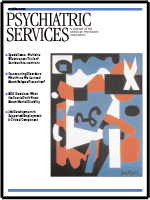Client Involvement in Services Research
To the Editor: Government agencies and consumer organizations are calling for the meaningful involvement of clients in research evaluating mental health services (1,2). However, a recent review noted that few papers have been published on this issue (3). To increase understanding of this topic, I report on key lessons learned from my experience as an academic consultant to a mental health day service, which was based on the clubhouse model. I conducted a collaborative evaluation with clients to inform future planning. Because this letter reports reflections rather than hard data, it was not necessary to obtain internal review board approval and informed consent was not
Clients made significant contributions to the successful development of the evaluation in a number of important ways. First, they assisted in the development of a questionnaire, ensuring that it covered clients' concerns. This approach prevented bias toward the provider's perspective, which has been identified as a potential disadvantage of traditional questionnaire research (4). Second, clients used their insight to suggest suitable modes of data collection that were successfully implemented, notably an anonymous "suggestion box" and focus groups. The suggestion box proved popular because it allowed clients to comment in their own time with complete guarantees of anonymity. The focus groups were well attended and well liked because they allowed clients who were uncomfortable with the questionnaire to participate. They also provided "safety in numbers" in that clients liked being able to voice concerns in the presence of fellow clients.
Third, training key clients as research assistants to assist with data collection and analysis was methodologically fruitful. The clients appeared to be particularly sensitive and skillful in helping other clients complete the questionnaire. This appeared to increase the response rate and also encourage more open and honest responses from clients, repeating a phenomenon observed when client interviewers have been used in other studies (5). Trained clients also worked with staff and myself in analyzing the data. Client involvement at this stage may increase the validity of the findings, as the different parties must reach consensus on emerging conclusions and their significance with staff, clients, and independent academics acting as a check and balance on one another's biases.
Overall, I noted that some clients, even some with serious mental illnesses, were quite capable of quickly understanding the scientific basis of research. Some key clients had attained master's or doctoral degrees before they became ill; others had attended related training courses. Their contribution to the design and implementation of the evaluation sometimes outstripped that of the organization's staff. In contrast, some staff (and other clients) had less understanding of the scientific basis of research. Thus, although some facilities and programs may want to conduct co-operative research, some time must be spent in meetings explaining methodologic issues in lay language.
Client involvement did have some disadvantages. Most notably, much greater resources in terms of time, labor, and finances are needed in this kind of cooperative research. One final issue that should be considered by academics is the endpoint of their involvement. Many researchers will feel that their interest should cease once the evaluation is complete. However, some clients may feel that academics should use their skill and leverage to act as "agents of change" after the evaluation and may feel a sense of betrayal if this is not the case. Discussion and agreement on this point at the beginning of the research may prevent possible ambiguity and conflict at the end.
Dr. Whitley is affiliated with the New Hampshire-Dartmouth Psychiatric Research Center in Lebanon, New Hampshire.
1. New Freedom Commission on Mental Health: Achieving the Promise: Transforming Mental Health Care in America. Final Report. DHHS pub no SMA-03–3832. Department of Health and Human Services, Rockville, Md, 2003Google Scholar
2. Geller JL, Brown J-M, Fisher WH, et al: A national survey of "consumer empowerment" at the state level. Psychiatric Services 49:498–503,1998Link, Google Scholar
3. Simpson EL, House AO: Involving users in the delivery and evaluation of mental health services: a systematic review. British Medical Journal 325:1265–1270,2002Crossref, Medline, Google Scholar
4. Polowczyk D, Brutus M, Orvieto AA, et al: Comparison of patient and staff surveys of consumer satisfaction. Hospital and Community Psychiatry 44:589–591,1993Abstract, Google Scholar
5. Clark CC, Scott EA, Boydell KM, et al: Effects of client interviewers on client-reported satisfaction with mental health services. Psychiatric Services 50:961–963,1999Link, Google Scholar



